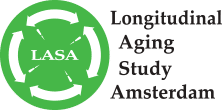Contact network
LASA filenames:
LASA167
Contact: Theo van Tilburg
Background
In regular interviews LASA included the collection of data on the personal network. For the migrant questionnaire there was a need for a shorter and less complex instrument to measure social network characteristics. To facilitate the comparisons of migrants and indigenous people questions on the contact network were included both in the regular questionnaire (six questions) and the migrant questionnaire (eight questions).
Measurement instruments in LASA
The questions on the contact network are introduced with the following phrase:
Now I want to ask questions on the people who you are associated with, other than those in your household. Association means that you visit them or they visit you, or have contact by phone, writing, or email. The answering possibilities are: ‘daily’, ‘once or few times a week’, ‘once or few times a month’, ‘once or few times a year’, ‘never or less than once a year’.
How often do you have contact with:
- children
- grandchildren
- children-in-law
- uncles, aunts, siblings, in-laws
- [Moroccan, Turkish] friends, acquaintances\ [Dutch or other] friends, acquaintances
- [Moroccan, Turkish] neighbors
- [Dutch or other] neighbors
Note: text in brackets in migrant questionnaire.
In Dutch:
De vragen over het contact netwerk worden als volgt geïntroduceerd:
Nu wil ik graag enkele vragen stellen over de mensen met wie u omgaat. Wij willen graag weten met welke personen die niet bij u in huis wonen u contact heeft. Daarmee bedoelen we op bezoek gaan (zij komen bij u op bezoek of u gaat bij hen op bezoek), mee telefoneren, aan schrijven, mee emailen. U kunt kiezen uit de volgende antwoordmogelijkheden: iedere dag, minstens 1 x per week, minstens 1 x per maand, 1 of enkele keren per jaar of minder dan 1 x per jaar/nooit
Hoe vaak heeft u contact met:
- uit huis wonende kinderen
- uit huis wonende kleinkinderen
- schoondochters en schoonzoons
- ooms, tantes, zussen, broers, en aangetrouwde familie
- [Turkse/Marokkaanse] vrienden en kennissen
- [Nederlandse of andere] vrienden en kennissen
- [Turkse/Marokkaanse] buren en buurtgenoten
- [Nederlandse of andere] buren en buurtgenoten
N.B. tekst tussen haken in migrantensurvey.
The question is (slightly adapted) from the survey “Gezondheid en Welzijn van Allochtone Ouderen (GWAO2003)” (Schellingerhout, 2004).
Questionnaires
LAS3B167 (medical interview, in Dutch), LASMB167 (main interview, in Dutch) / LASAI167 (medical interview, in Dutch)
Variable information
LAS3B167 / LASMB167 / LASAI167
(pdf)
Availability of information per observation ¹
| A* | B* | C | D | E | 2B* | F | G* | H | 3B* | MB* | I | J | K | ||
|---|---|---|---|---|---|---|---|---|---|---|---|---|---|---|---|
| Contact network | - | - | - | - | - | - | - | - | - | Me | Ma | Me | - | - | |
¹ More information about the LASA data collection observations is available here.
* A=Living arrangements and social networks of older adults (LSN);
2B=baseline second cohort;
3B=baseline third cohort;
MB=migrants: baseline first cohort
Ma=data collected in main interview;
Me=data collected in medical interview
Previous use in LASA
(None at the moment)
Reference
- Schellingerhout, R. (2004). Gezondheid en welzijn van allochtone ouderen. Den Haag: Sociaal en Cultureel Planbureau.
Date of last update: June, 2014 (Theo van Tilburg)
